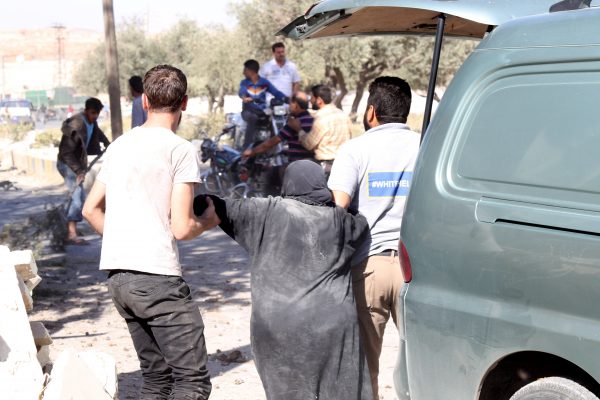Losing Three Sons, Fearing for the Rest

"A mother’s grief as the conflict takes its toll on her family."
My six sons were among the first to join the revolution. Each of them offered everything they could to make it succeed. In 2013, two years after the revolution began, my sons got involved in the armed struggle.
My eldest son Mohamed was married with two boys. He had built his house next door to mine so that he could stay close even after he got married. When I left my house, I often saw him on the balcony smiling at me and inviting me to drink tea.
Mohamed became a tank specialist because he had experience from his compulsory military service.
One day Mohamed was standing on his balcony, but didn’t invite me to drink tea as usual. He asked me to pray for his victory.
He told me that he was about to take part in a major battle in the town of Kfar Abida in Hama’s countryside. The town was controlled by the regime and the rebels sought to liberate it.
I gazed at Mohamed. It was as if a voice was telling me, “Take a good look at him because you will never see him again.”
Mohamed left the house, looking behind him and smiling at me, his wife and his children. He crossed the street and kept walking until we could no longer see him.
His son Samer came and asked me, “Will dad come back, as my mother told me? Or will he be martyred like some of his friends, as I heard him once say?”
I didn’t know what to tell him and just kept silent. Then he said, “Dad loves heaven”.
I waited all that day for news of Mohamed, until his friends came to tell us that he had been martyred.
I heard the words they said but I didn’t believe them.
I asked them in shock, “Where is he?”
They told me that he had been heroic in battle and that they would bring his body later.
Amid the weeping of Mohamed’s wife and children, Samer came to me and said, “Didn’t I tell you that dad loves heaven?”.
This made everyone cry even harder.
The days went by and the pain of loss only grew worse. I went out every day to look at his balcony and ask, “Where are you Mohamed, why don’t you invite me to drink tea again?”
Five months later, I stood in front of my second son, Hussein, just as I had stood in front of Mohamed.
He was about to take part in a battle in the town of Murak in the Hama countryside. He said to me, “What’s wrong, mum? Why are you standing there like that?
“You won’t come back,”I replied,
He smiled and said, “We are fighting the regime forces to either win or die for victory.”
I said, “If you don’t come back, tell your brother Mohamed I say hello.”
And I cried even harder than the day I learned that Mohamed had died.
Two days later, people were saying that the regime had besieged the rebels in Murak. I looked at my neighbour and told her that Hussein was in danger, so we began praying for him.
Night came and I heard people outside the house calling out for my husband. I expected Hussein to be among them.
I ran out and saw them carrying Hussein’s dead body. I kissed it and rubbed his head, my tears dripping on him. His wife was completely devastated. They had only been married for a short time and didn’t have any children.
That’s how 2013 was, it was the year of separation. I lost my sons Mohamed and Hussein within five months of each other.
After that, I tried protecting my four remaining sons, but their passion was too great. I couldn’t control them anymore, whatever I said or did, even if I cried bitterly to prevent them from going to war.
They told me that they had two battles to fight; the first for freedom, the second for Mohamed and Hussein.
When I saw them acting this way, I decided I should just pray for their safety and if they were killed, pray that God will accept them as martyrs.
My little Ismail, still unmarried, remained at home with his smile and optimism. His voice filled the house. He worked preparing missiles for the revolutionaries.
One day, he sat next to me and said, “I saw Mohamed and Hussein in my dreams, sitting next to me laughing and joking, saying, “We missed you brother.”
Then he started laughing.
“What’s going on?” I asked him.
He replied, “Will you say to me what you said to Mohamed and Hussein? That I will go and won’t come back?”
He laughed while I felt my heart trembling.
The next day, Ismail went to work preparing missiles but didn’t come home at his usual time. Then his friends came to tell me that a missile had exploded and Ismail was martyred.
After that, people in the village started calling me al-Khansa, a historical figure known for the poetry she wrote for her four sons killed in battle.
Will I lose the rest of my sons?
Muhammad, Hussein and Ismail were martyred. I think of them always. I hope that the tide of blood will stop, that Bashar al-Assad will leave and that we will live in peace and freedom.
Safaa al-Farahat is a mother-of-three whose husband was fired from his job by the regime at the beginning of the revolution. They all now live in one room and Safaa is trying to work to help support her family.
